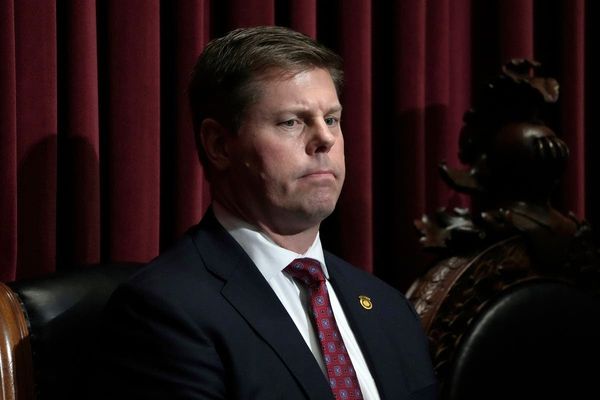
A public university in California has placed its president on leave for “insubordination” after he agreed to student demands for an academic boycott of Israel.
Mike Lee was suspended from Sonoma State University following an announcement on Tuesday that the liberal arts college north of San Francisco had agreed with Students for Justice in Palestine (SJP) to become the first US university to refuse to work with Israeli academic institutions.
“None of us should be on the sidelines when human beings are subject to mass killing and destruction,” Lee said in a message to students announcing the move.
But following a swift backlash from pro-Israel groups and the wider California state university system, Lee apologised for agreeing to the boycott, saying that it “marginalised” other students and caused harm.
The dispute comes amid a surge in demands from pro-Palestinian students across the US for their universities to cut financial and academic ties with Israel as the death toll in Gaza continues to climb. The majority of those identified among the more than 35,000 Palestinians killed are women and children.
Lee said in his original message to students that Sonoma State does not presently have exchange programmes or academic collaborations with Israeli universities and that that will not change.
“SSU will not pursue or engage in any study abroad programs, faculty exchanges, or other formal collaborations that are sponsored by, or represent, the Israeli state academic and research institutions,” he wrote.
Lee added that the university will only engage with Israeli academics “acting in a personal capacity”. He also said the college would review its investments to find “ethical alternatives” to Israel and set up a Palestine studies programme.
The move drew immediate criticism from pro-Israel groups, who accused the SJP of glorifying Hamas and discriminating against Jewish students. The Anti-Defamation League told the Israeli newspaper Haaretz that “Lee capitulated to protesters and agreed to a dangerous set of demands in one of the most offensive and outrageous agreements to date with encampment protesters”.
California state senator Scott Wiener accused Sonoma State of aligning the campus with the boycott, divestment and sanctions (BDS) campaign, which he described as “a movement whose goal is the destruction of Israel”.
Sonoma State is part of the larger California State University system. On Wednesday, CSU’s chancellor, Mildred Garcia, said Lee had not sought authorisation for the agreement with the student protesters.
“That message was sent without the appropriate approvals,” she wrote. “For now, because of this insubordination and consequences it has brought upon the system, President Lee has been placed on administrative leave.”
Lee then issued a second statement.
“In my attempt to find agreement with one group of students, I marginalized other members of our student population and community,” he wrote.
“I realize the harm that this has caused, and I take full ownership of it. I deeply regret the unintended consequences of my actions.”
The demand to cut academic ties is rooted in the broader BDS campaign to sanction Israel. It follows a call from Palestinian intellectuals in the West Bank city of Ramallah for an international boycott of Israeli universities starting two decades ago.
In 2009, American academics founded the US Campaign for the Academic and Cultural Boycott of Israel in response to an attack on Gaza that year and to counter what it said was the “censorship and silencing of the Palestine question in US universities, as well as US society at large”.
Members of the American Studies Association voted in 2013 in support of a resolution to boycott Israeli institutions but not individual academics. Eight former presidents of the ASA opposed the move, calling it “antithetical to the mission of free and open inquiry for which a scholarly organization stands”.
The ASA’s president at the time, Curtis Marez, told the New York Times that the US has “a particular responsibility to answer the call for boycott because it is the largest supplier of military aid to the state of Israel”.
Since then, the call for an academic boycott has gathered support from other academic and student groups, but no university has agreed to cut ties with Israeli institutions.
Supporters say the campaign is in part a response to suppression of Palestinian universities by the Israeli military and government, and their wholesale destruction in Gaza in recent months, along with what they see as the complicity of Israeli universities with the government and military in human rights abuses against Palestinians.
Some opponents accuse the boycott movement of “singling out Israel” as part of an antisemitic campaign to delegitimise the Jewish state. Others say it is counterproductive because US universities should seek to influence Israeli institutions, not shun them.
There has also been stinging criticism of deals between university administrators and pro-Palestinian students at other universities trying to avoid a confrontation between police and protesters as seen at Columbia University, the University of California at Los Angeles and other campuses.
Northwestern University agreed to establish an advisory committee on university investments in return for students dismantling a tent encampment. The American Jewish Committee accused the university of “succumbing to the demands of a mob”.
Brown University agreed to vote on divestment from companies affiliated with Israel in a deal with student protesters.
On Tuesday, students at Harvard University ended their encampment after the university agreed to discuss demands that it divest from Israel. Harvard’s endowment is estimated at about $50bn, but its investments are not made public.
The Evergreen State College agreed with students to call for a ceasefire in Gaza and to explore divesting from companies that profit from “the occupation of Palestinian territories”.






